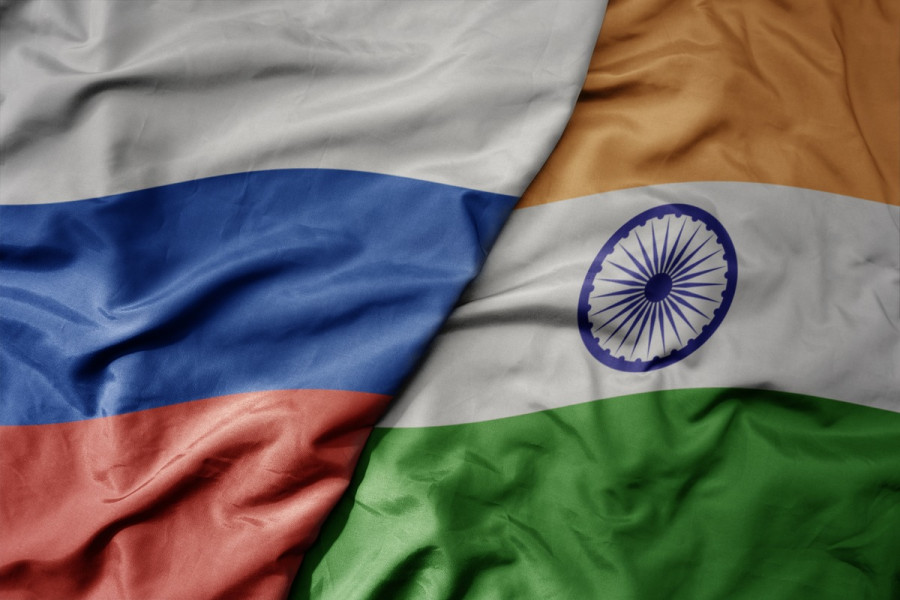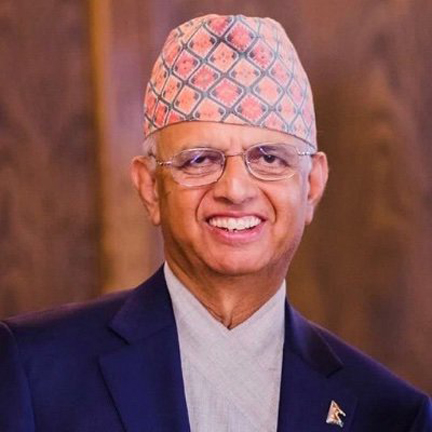Columns
Russia and India in changing global order
Russia’s pursuit of power at the expense of economic reform continues to constrain its potential.
Dinesh Bhattarai
The global order is undergoing a profound transformation marked by power shifts, technological advancements, supply chain disruptions and the fragmentation of traditional alliances. Historically, Russia has been a key global power, but it now faces challenges from economic stagnation, strategic dependencies and a lack of technological innovation. Conversely, India, the world’s largest democracy with the fastest-growing economy and an emerging power in the Indo-Pacific, is balancing its global power aspirations and positioning itself as an independent pole in the multipolar world.
For over three centuries, Russia has oscillated between ambitions of global dominance and periods of internal stagnation. Like its national animal, the bear, Russia’s history reveals an enduring quest for relevance—sometimes hibernating, growling, and sometimes turning ferocious. Ever since Peter the Great founded the Russian Empire in 1721 and expanded westward during Empress Catherine the Great’s reign, Russia became one of the great powers of Europe, with trade and nationalism at its core.
In the 20th century, the Soviet Union emerged as a superpower—economically, politically and militarily. It became a rival pole to the United States-led block. After World War II, Moscow responded to the North Atlantic Treaty Organisation (NATO) of European and North American states formed in 1949 by establishing its own Warsaw Pact in 1955. The collapse of the Berlin Wall in 1989 was quickly followed by the dissolution of the Warsaw Pact and the Soviet Union. President Vladimir Putin called the break-up of the Soviet Union in 1991 a “major geopolitical disaster of the century.”
Economic constraints, strategic vulnerabilities
Russia’s aspirations have often overwhelmed its capabilities, resulting in the breakup of the Union due to what Paul Kennedy calls “imperial overstretch.” It was mired in repeated cycles of coerced modernisation. Efforts were made towards rapid industrialisation in the former Soviet Union under Joseph Stalin, which resulted in economic inefficiencies and human suffering. Similar patterns persist today as Russia’s heavy reliance on energy exports and a dwindling technological base hinder its long-term competitiveness. Its economy remains dependent on the export of hydrocarbons, leaving it vulnerable to global energy market fluctuations.
Western sanctions imposed after the annexation of Crimea in 2014 and the ongoing conflict in Ukraine since February 24, 2022, have further isolated Moscow, pushing it closer to Beijing. The “friendship with no limits” agreement of February 4, 2022, reflects a growing asymmetry between China and Russia. However, Russia relies on Chinese technology and financial systems, and China’s dominance in semiconductors and electric vehicles underlines an imbalance.
Studies by the Carnegie Endowment and Brookings Institution highlight that while this partnership may provide Russia with a temporary lifeline, it risks reducing Moscow to a junior partner in the Sino-Russian relationship. This shift points towards the dynamics seen in other asymmetric alliances, such as North Korea's dependence on China.
Russia’s political structure, characterised by centralised authoritarianism, is a double-edged sword. While providing regime stability, it has stifled innovation and limited adaptability. Freedom House and Transparency International reports have emphasised how systemic corruption and a lack of institutional reforms and transparency undermine Russia’s global aspirations.
India’s strategic position
India has long valued its historical relationship with Russia, particularly in defense cooperation. During the Cold War, Moscow was a key supporter of India, providing military equipment and diplomatic backing. However, New Delhi diversified its partnerships post-Cold War, forging closer ties with the United States, France and other Indo-Pacific powers to counter China’s regional dominance.
India’s relationship with China is a complex mix of economic interdependence and strategic rivalry. The 2020 Galwan Valley clash and ongoing border disputes indicate the fragility of this relationship. India’s rejection of China's Belt and Road Initiative (BRI) and its participation in the Quadrilateral Security Dialogue (Quad) counters Beijing’s influence in Asia. While economic cooperation is flourishing, strategic rivalry continues despite the October 21 breakthrough between their diplomatic and military negotiators and the Xi-Modi meeting on the sidelines of BRICS in Kazan, Russia. Resuming patrolling along the de facto border will pave the way for “disengagement, de-escalation and normal management of the border.”
India’s emphasis on economic reforms and technological innovation positions itself as a critical player in the global order. Reports from the International Monetary Fund (IMF) and World Economic Forum (WEF) note India’s potential to drive regional growth through its demographic advantage, expanding middle class and thriving IT sector. Through domestic manufacturing and the enhancement of digital infrastructure, India seeks to connect its economic ambitions with its geopolitical strategy.
Russia and India operate in a fragmented global environment characterised by resurgent nationalism and competing narratives. While Russia exploits these divisions to challenge Western norms, India leverages its democratic credentials to foster inclusive partnerships. This underscores the strategic divergence between a declining power reliant on coercion and a rising power embracing soft power and multilateralism.
Russia’s reluctance to integrate into a US-led global system differs from India’s selective strategy. India’s approach mirrors Japan's Meiji Restoration, combining modernisation with cultural preservation. However, Russia’s historical pursuit of power at the expense of economic reform continues to constrain its potential. India’s decision to maintain neutrality in the Russia-Ukraine war illustrates its aspirations to stand independently.
Balancing aspirations and realities
As Moscow increasingly aligns with Beijing, India must seek more opportunities to diversify its defense procurement and invest in indigenous capabilities to mitigate its reliance on Russian defense equipment.
India’s active participation in multilateral forums such as The Quad, BRICS and Group of Twenty (G20) allows it to shape global governance frameworks while advancing its interests. India’s global aspirations must be underpinned by domestic stability and economic strength. Addressing infrastructure deficits, education disparities, growing intolerance, political polarisation, and income inequality will enhance its geopolitical leverage.
By fostering resilience through technological innovation, economic reforms and strategic diplomacy, India can chart a course that secures its place in the evolving global order.




 12.73°C Kathmandu
12.73°C Kathmandu















